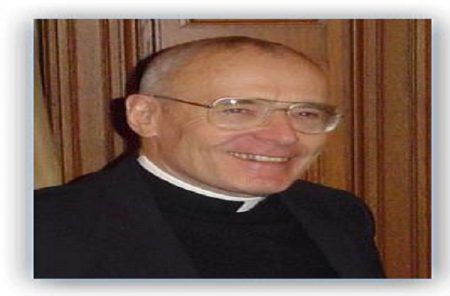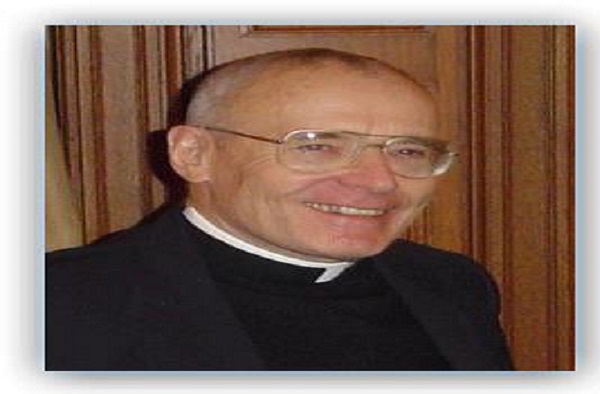
On August 27, Campaign Life Coalition interviewed Fr. Ian Boyd by telephone. Fr. Boyd, editor of The Chesterton Review, was a founder of Campaign Life in 1978. We talked to him about the pro-life movement over the past 35 years.
Campaign Life Coalition: 35 years ago, together with a group of other pro-life activists, you founded Campaign Life. Why did you come together to create this new prolife group?
Fr. Ian Boyd: There was a crisis, and that was the abortion law that had been passed by the Trudeau government (in 1969). We felt that ordinary people should take some strong measures to see what could be done to defend life, since their representatives weren’t doing a very good job in speaking up for the unborn. That is what motivated people, and it was an immensely popular, and truly grassroots, movement. We believed that most Canadians were on the side of life, but that unfortunately many of them were picking up very bad ideas from a corrupt culture. According to Chesterton, cultures need to be evangelized because ordinary people generally pick up their ways of thinking and behaving from the culture they are immersed in. Fifty years ago, when the culture was basically healthy, even the atheists were pro-life. Fifty years later, rather good people were wounded by a toxic culture and started mouthing ideas that their parents and grandparents would never have accepted. It wasn’t that people have become worse in those fifty years, the culture had become worse and it was having that bad effect on us. It was a counter-cultural effort that the Campaign Life people were making, and I think that’s basically why we met.
CLC: You developed the first draft of the CLC Questionnaire. These questionnaires have been such an important tool in informing the public on where candidates stand on the life and family issues. In the past, politicians were more willing to answer them. Nowadays, they refuse to even address these issues in conversation. What are good ways to engage in dialogue with politicians, and how can we get feedback from them.
Fr. Boyd: It certainly is a serious difficulty. Politicians are terrified of permanently alienating any part of their electorate, and as long as the pro-life issue is simply one among others, then they will be reluctant to say anything. You must remind them that for a certain part of the electorate, it’s an issue that is so basic, that it will actually disqualify the candidate from consideration, regardless of his other good qualities. We need to tell the politicians that if they can’t see the need to protect the most vulnerable members of our society, then they simply do not deserve support no matter what other views they have. Pro-life voters must also be taught that like human sacrifice, matricide, etc., abortion is a disqualifying issue. Furthermore, the unwillingness to take a good stand on the protection of human life, whether it’s regarding abortion or euthanasia, and the refusal to answer is in itself an answer, and a very bad one. Even if we have trouble getting everyone to agree, we want a law in place to remind people, to teach people, and to help bring people to their senses about the wrongness of abortion. Of course we would like to end all abortions right now, but we are realists and we know that in a bad situation, this sometimes is a slow process, but we will not tolerate a politician or give our vote to a politician who refuses to protect life.
CLC: You once said that nowadays it’s more difficult to approach people from the head, now you have to do it from the heart. Can you elaborate on this statement?
Fr. Boyd: Human beings are not rational animals only, we are emotional animals, and we have to touch people’s hearts as well as their heads if we are to motivate them. That is why, for example, the recent scandal in Philadelphia had such a terrific effect: when the police stumbled on Kermit Gosnell’s office, suddenly people found out in graphic detail what was happening to these little children. They found out what “pro-choice” means. That was an appeal to the human heart. In our pro-life effort, it is important for us to remind people of the reality of abortion. It’s unspeakable, but we have to render a picture of it to people. The pro-life movement is prophetic in a way, and prophecy doesn’t mean, strictly speaking, predicting the future. It’s speaking the truth to people who have become deaf and blind to realities. You have to wake them up, and I think that’s the great mission of the pro-life movement. We are doing what our elected leaders have neglected to do.
CLC: Over the years, there have been many ups and many downs. How would you describe these years and can you share some thoughts about some of your experiences in the pro-life trenches? What would you say were some success and failures you were involved in?
Fr. Boyd: I find that the prolife movement has always been divided into two groups. One group, the principled people opposed to all abortions, that never would they agree to take the life of a single innocent human being no matter what stage of life they are at. I’m all together with them. The second group, I refuse to despise, they are also absolutists, but they say we can work towards that goal and in the meantime, we should do everything we can to cut down the number of abortions, even before we get rid of abortion absolutely. You feel unprincipled if you start talking about cutting down the numbers as if it makes it sound as you are willing to accept any, but we do want to cut down numbers, and we do want to do everything. We take into account the current situation and the way in which some people are slow learners, and we gradually teach them and we do what we can.
The other thing is the ecumenical dimension of the pro-life movement. People who do not agree about some doctrinal questions find themselves fighting together in the trenches of the culture war, and that’s bringing them closer together.
The pro-life movement should also get back in print, read again, and draw people’s attention to notable writers. Authors such as Chesterton and C.S. Lewis are writers who make a huge difference, and we should be instruments of God by putting good literature into the hands of people, especially young people. Chesterton’s prophetic writing about the pro-life issue is a constant, great help to us. From the beginning of Chesterton’s career, he predicted that we were going to face a culture war far more terrible than anything that had occurred in the past. He said: “before the liberal idea is dead or triumphant we shall see wars and persecutions the like of which the world has never seen.” He predicted that the next great heresy would be an attack on morality, and especially on sexual morality.
In Canada, one of the heroes of the pro-life movement is George Grant, and was a great spokesman. Malcolm Muggeridge was another great figure. Fr. (Alphonse) de Valk is a national treasure. He knew the complete history of the abortion question in Canada, wrote a book about it, and kept a complete file of what politicians did.
Those great minds and writings should be remembered.
CLC: What words of advice would you offer to someone who wants to get involved in the pro-life movement?
Fr. Boyd: My first advice would be that we are always more effective in a community than as single individuals, to get in touch with Campaign Life, with a pro-life group, that it multiplies your effectiveness a hundredfold when you bring your talents to the group. Don’t remain an isolated individual. The other advice would be letter-writing. I don’t mean a form letter, I mean, especially if it’s a hand-written letter to your local politician, and not on some general question, but on some specific issue which has come up, and remind the politician that you don’t usually write letters, but there are a thousand people like you who feel strongly about this very issue. Politicians take a letter like that seriously, one that doesn’t come from the organization but comes from the individual.
For example, there was something on CBC television that I objected to. I wrote a personal letter, not to the producer of the program, but to the chairman of the corporation, Mr. Johnson. I put a post-script in the letter and said, I know that you will take this letter seriously because my brother in law Vince Dantzer, who worked with you years ago in Regina told me that you were an honourable man and that he thought highly of you. I told him we had Campaign Life, a pro-life lobby, and we raised money to send people to Ottawa to lobby the politicians. CBC Television paid practically no attention to the lobby, and only mentioned it, but they made a great deal of a little feminist group who was also there. Johnson personally wrote me back and said that he would set up a group to look into this matter and have them report back to him. I think that had an effect.
A move like that, how can I put it, chilled the enemy, when they get pushed back from people they are afraid of, or from people who are in charge of them. Make use of every personal connection you have, if someone knows a politician, if someone has worked for a party, anything, you know we are a connected people, so never despair. Quoting Chesterton, if you remember the battle of the white horse where he compares Christians to hares being chased by hunters, the hare says “though they hunt us like hares on the hillside, the hare has still more heart to run than they have heart to ride,” so you know we’ll keep on fighting and be cheerful too. We are people of hope, we are Easter people.
About Fr. Ian Boyd
A priest of the Congregation of Saint Basil, Father Ian Boyd is an internationally recognized Chesterton scholar and author. He was Professor of English at St. Thomas More College, University of Saskatchewan for many years. He was a founding member of Campaign Life Coalition (formerly Campaign Life) in 1978, and as pastoral advisor to Campaign Life, drafted the first CLC questionnaire. Father Boyd is the Founder and Editor of The Chesterton Review and the President of the G.K. Chesterton Institute for Faith & Culture based at Seton Hall University. For more information about the work of the G. K. Chesterton Institute for Faith & Culture and its journal The Chesterton Review and to subscribe, please visit: www.shu.edu/go/chesterton.
For the full transcript of the interview go to www.TheInterim.com.
– See more at: http://www.theinterim.com/issues/pro-life/interview-with-fr-ian-boyd-observations-on-the-pro-life-movement/#sthash.ZHCAIJXq.dpuf
